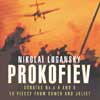Prokofiev Piano sonatas Nos 4 and 6; romeo and Juliet
The steely side of Prokofiev’s piano writing comes uncompromisingly to the fore
View record and artist detailsRecord and Artist Details
Composer or Director: Sergey Prokofiev
Genre:
Instrumental
Label: Warner Classics
Magazine Review Date: 4/2004
Media Format: CD or Download
Media Runtime: 75
Mastering:
Stereo
DDD
Catalogue Number: 2564 61255-2

Tracks:
| Composition | Artist Credit |
|---|---|
| Sonata for Piano No. 4 |
Sergey Prokofiev, Composer
Nikolai Lugansky, Piano Sergey Prokofiev, Composer |
| Sonata for Piano No. 6 |
Sergey Prokofiev, Composer
Nikolai Lugansky, Piano Sergey Prokofiev, Composer |
| (10) Pieces from Romeo and Juliet |
Sergey Prokofiev, Composer
Nikolai Lugansky, Piano Sergey Prokofiev, Composer |
Author: David Fanning
Lugansky is a forthright, no-nonsense player, who may appeal to those who like their Prokofiev straight and minimally interpreted. It is no mean pianist who can bring such combined clarity and strength to the Sixth Sonata. Lugansky takes all obstacles in his stride, so that the large-scale continuity of musical thought is unusually well delineated. On the other hand, if you want an exploration of the drama of the piece, of the human issues at stake in it, this is emphatically not for you.
There is no sense of threat or impending doom here, and therefore none of achievement either, beyond the demonstration of fine pianistic credentials. A case in point is the return of the main theme in the first movement, where the music just restarts as though nothing very momentous has happened in the interim. Lugansky’s superior fingerwork in such passages as the finale’s treacherous coda places him well above the average international competition winner, but as yet his colouristic range and temperament are not in the league of such interpreters as Richter (in particular his 1960 Carnegie Hall performance) or the teenage Kissin (especially his live 1987 Tokyo account).
Similarly Lugansky’s account of the Fourth Sonata is admirably fluent and unfussy. But this work was always a special favourite of Richter’s, and in his superb 1966 Aldeburgh recital, captured in decent sound by the BBC, he ran the gamut from confiding semi-secrecy to sheer abandon, all with a fund of fantasy and colour that is not as yet at Lugansky’s disposal.
Wit, charm and balletic grace are conspicuous by their absence in these unsmiling accounts of the Romeo and Juliet transcriptions. Fast movements are merely rattled off and slow ones show little understanding of the emotional temperature of the ballet scenario. Once again, though, judged in purely pianistic terms Lugansky is up there with the best of them. All very frustrating. Warner’s recording is a fraction on the dry side of ideal but otherwise nicely judged.
There is no sense of threat or impending doom here, and therefore none of achievement either, beyond the demonstration of fine pianistic credentials. A case in point is the return of the main theme in the first movement, where the music just restarts as though nothing very momentous has happened in the interim. Lugansky’s superior fingerwork in such passages as the finale’s treacherous coda places him well above the average international competition winner, but as yet his colouristic range and temperament are not in the league of such interpreters as Richter (in particular his 1960 Carnegie Hall performance) or the teenage Kissin (especially his live 1987 Tokyo account).
Similarly Lugansky’s account of the Fourth Sonata is admirably fluent and unfussy. But this work was always a special favourite of Richter’s, and in his superb 1966 Aldeburgh recital, captured in decent sound by the BBC, he ran the gamut from confiding semi-secrecy to sheer abandon, all with a fund of fantasy and colour that is not as yet at Lugansky’s disposal.
Wit, charm and balletic grace are conspicuous by their absence in these unsmiling accounts of the Romeo and Juliet transcriptions. Fast movements are merely rattled off and slow ones show little understanding of the emotional temperature of the ballet scenario. Once again, though, judged in purely pianistic terms Lugansky is up there with the best of them. All very frustrating. Warner’s recording is a fraction on the dry side of ideal but otherwise nicely judged.
Discover the world's largest classical music catalogue with Presto Music.

Gramophone Digital Club
- Digital Edition
- Digital Archive
- Reviews Database
- Full website access
From £8.75 / month
Subscribe
Gramophone Full Club
- Print Edition
- Digital Edition
- Digital Archive
- Reviews Database
- Full website access
From £11.00 / month
Subscribe
If you are a library, university or other organisation that would be interested in an institutional subscription to Gramophone please click here for further information.




